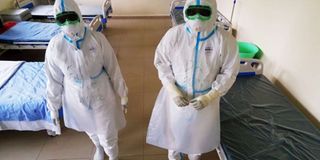8 medics at KNH test positive for Covid-19 in just 48 hours

What you need to know:
- This is worrying because healthcare workers are expected to handle rising Covid-19 cases.
- It comes amid healthcare workers’ complaints of being given low quality masks.
In just 48 hours, eight health staff at Kenyatta National Hospital tested positive for coronavirus, with one admitted to hospital, even as the parent ministry reports that most hospitals have little to no-infection control mechanisms.
This is worrying because healthcare workers are expected to handle rising Covid-19 cases as the Ministry of Health reported 461 new cases, amid healthcare workers’ complaints of being given low quality masks.
The cases at Kenyatta, the Nation has learnt, are mostly from the paediatric department. The rest are in home-based care.
COMPLAINTS
The latest revelation comes amid complaints by nurses and doctors in high-traffic health facilities that they are being given masks meant for the community, rather than those for medical purposes, thus exposing them to the risk of infection.
Apart from KNH, Nakuru Level 5 reported using lower-grade surgical masks instead of the recommended N95.
In Kisumu County, Kenya Medical Practitioners, Pharmacists and Dentists Union Nyanza branch chairman Kevin Osuri told Nation that the few available masks were substandard.
In Nyandarua, health workers are asked to reuse their masks. This is a danger to the public because they could pass the infection on to other patients after catching it at work.
PROTECTIVE EQUIPMENT
The Health ministry has admitted that healthcare workers don’t have the right personal protective equipment.
In his update speech yesterday, Health Cabinet Secretary Mutahi Kagwe attributed the rising infections among healthcare workers to “overcrowding, lack of established practices of infection control, and poor implementation of infection prevention control guidelines and protocols”.
Mr Kagwe added that healthcare workers have little training in infection control, which leaves them exposed.
The concerns arise after the deaths of two nurses and one doctor early this week.
Kenya National Nurses Association official Stella Githaiga told the Nation that as the numbers of Covid-19 patients increase, healthcare workers are getting more exposed.
RIGHT MASKS, WRONG PACKAGING
Notably, KNH last week received the right masks in the wrong packaging, but returned them to the suppliers because they were loose.
By Wednesday, over 300 medics had contracted the coronavirus, with three deaths, according to the Ministry of Health.
The nurses’, clinical officers’ and the doctors’ unions have lamented that this has been partly caused by the shortage of personal protective equipment.
A lack of protective equipment for healthcare workers has been a constant issue in the pandemic, due to the interruption of the global supply chain. The Ministry of Health responded by boosting local manufacturing but issues of quality have been raised by healthcare workers.
SHORT SUPPLY
With crucial protective gear such as masks in short supply, many hospital managements accepted surgical masks as “an acceptable alternative” to highly protective N95 respirators unless workers are performing intubations or other procedures on patients with Covid-19 that could unleash high volumes of virus particles.
However surgeon Elly Nyaim said surgical masks are considerably less protective than N95 masks and respirators. The n95 draws their name from their ability to filter out 95 per cent of nearly all of bacteria, viruses, fungi and other microbes even in their tiniest form, as tiny as 0.3 microns wide. The mask is made up of a thick mesh of plastic fibres which trap the disease causing germs either on the inside (for the person who is sick and does not want to release this to the environment).
While protective the surgical masks have a string that can be put on ear loops or tugged under the chin but this comfort makes looser which allows more air to leak through the sides. If they are not tight they expose the health worker to risks.
While Kenya has not conducted any study on the effectiveness of the mask, studies from other counties paint a ghastly picture: A 2013 study from China published in the journal American Journal of Respiratory and Critical Care Medicine found that twice as many health workers (17 per cent) contracted a respiratory illnesses such as TB if they wore only a surgical mask while treating sick patients, compared with (7 per cent) who continuously used an N95.




